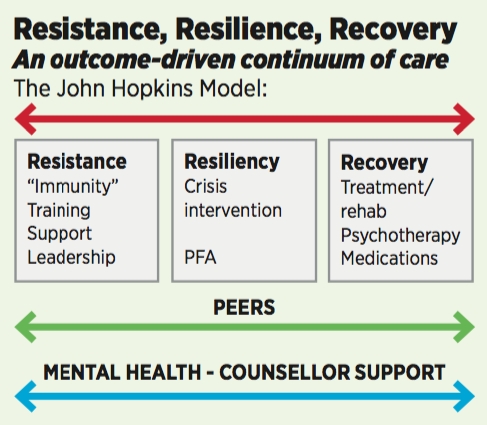
Features
Charging the batteries
If you’re looking for a good debate, just mention the word CISM — Critical Incident Stress Management. There are more opinions about this theme than one cares to know. However, many have not taken the time to actually clarify its meaning so the result is like the “broken telephone” game. The message received is not the one sent.
August 24, 2018 By John Robertson

To illustrate this, a psychologist said at a first responders suicide prevention event that CISM and debriefings don’t work; debriefings don’t prevent post-traumatic stress disorder (PTSD). Debriefings need to be used as part of a group process and should never be used as a stand-alone intervention.
The irony is that he was actually bolstering the marketing brochure for CISM, which is not, and should never be considered a Critical Incident Stress Debriefing (CISD). It was never intended to prevent PTSD; it is to mitigate the crisis reactions with peers and must be used as part of a group process. Sadly, many Employee Assistance Programs (EAPs) don’t understand this and instead they run debriefings alone with some clinicians who are not trained in it.
CISM is like the toolbox and CISD is a tool in this toolbox. The CISM process must integrate three core areas:
1.) Pre-incident education, supports, training and equipping integrated with coaching (i.e. not a classroom model). This can be essentially the exact same model for use of force, firearms., etc.
2.) Then it must have an intervention process. When things hit the fan, what about the people? So many have emergency plans but what about the human beings who have family on the phone while they are on scene and needed there, for example? How do we help them?
It is imperative to remember that a crisis is never determined by an event; it is always determined by the reactions to an event. One event that gives me a severe psychological charlie-horse may not even make my colleague’s radar, for example.
Let’s say two officers attend a child fatal case. One of the officers, who does not have children, walks away feeling sad but the other feels like she’s taken a shot to the solar plexus as she has a child in the same age group. Peer support matters, but if the agency only focuses on the one sad officer, then it might seem like “everyone is fine,” and there could be unlooked-for performance issues down the road. By the way, this is not a performance issue.
3.) Next is the follow through process to get the affected person into a healthy new norm. Most of us have had the physical charlie-horse experience and the coach that instructs us to walk it off, telling us we’re fine, even though it still flipping well hurts. This approach is the same thing as saying to a person after a crisis, “Suck it up.”
For all the education and training happening, we are still allowing people to do this to each other. Want proof? Watch and listen to how the word “strong” is applied in everyday speech, as if being “strong” means showing no emotion.
Some of the death notifications I have had to do went the “best” they could because I showed emotion. On the other hand, I saw reactions when an officer shared information without emotion (aka it’s just a transfer of information) and it was not ideal.
To think of the CISM process, think of a human as a battery. Whether it is aging parents or kids, or workplace dynamics, life will drain our battery like the dome light on older cars. A critical event just draws too much for us to absorb, like leaving the dome light on during a cold winter night. Self-care and peer support is about getting some charge back into our batteries.
CISM is not a debriefing or a defusing. It is the process of pre-incident training and education, intervention and post-event support, and follow-through, too.
If the organizational thinking behind CISM is not along this continuum when someone is impacted by a crisis, the result will be “whack-a-mole” approach. This process starts with peers and mid-senior leadership. Perhaps it could start with you.
John Robertson is a certified trauma specialist, certified human behaviour specialist and approved instructor in Group, Advanced Group, Individual-Peer Crisis Intervention and Support, Grief Following Trauma, and law enforcement perspectives for CISM enhancements. He is the founder of FORTLOG Services and is based in Ottawa.
Print this page